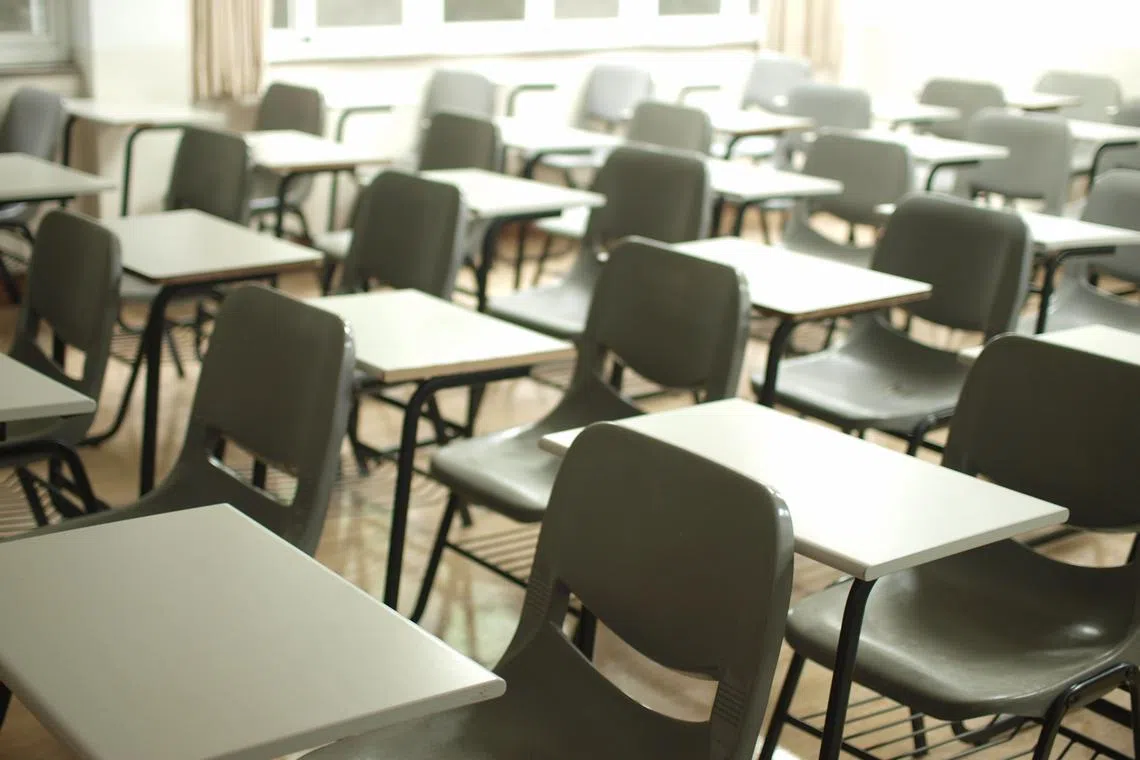Suicide of South Korea teacher, 23, puts spotlight on plight of educators in classrooms
Sign up now: Get ST's newsletters delivered to your inbox

An early career teacher at an elementary school in Seocho-gu, southern Seoul, was found dead in her classroom on Tuesday.
PHOTO ILLUSTRATION: UNSPLASH
Follow topic:
SEOUL - A debate over teachers’ rights in South Korea was raised on Thursday, after an elementary school teacher was found to have taken her own life in her classroom amid rumours of bullying by a student’s parents.
The Seoul Metropolitan Office of Education on Wednesday confirmed that an early career teacher at an elementary school in Seocho-gu, southern Seoul, was found dead in her classroom on Tuesday morning before school started. According to reports, the teacher was a 23-year-old woman who passed the teacher certification exam in 2022 and joined the school in March that year.
Local media reported that the teacher suffered from months of bullying and pressure at the hands of a parent, whose first-grade daughter is also allegedly a perpetrator of bullying at the school.
The school, however, denied that any bullying of the teacher had occurred via a statement on Thursday, adding that it would cooperate with the police investigation.
The case was reported a day after another female elementary school teacher in Seoul was allegedly assaulted by a sixth-grade male student in front of other students, resulting in her admission to hospital. The teacher was diagnosed with post-traumatic stress disorder because she claimed to have been held responsible for the matter by the student’s parents.
Both cases enraged teachers nationwide, who said they laid bare the dark reality of public schools where the authority of teachers is no longer respected in classrooms.
The country has seen a stark increase in the number of teachers being physically assaulted or attacked by students and parents, with a total of 1,133 teachers having been subject to such harassment between 2018 and 2022, according to data released by the Ministry of Education. Also, the annual number of reported cases of students breaching the rights of teachers in classrooms surpassed 2,000 last year.
While the weakening of teachers’ authority may be attributed to different factors, critics say banning corporal punishment is the root cause of teachers’ rights being trampled.
In the past, teachers could physically punish students for their misbehavior, but such punishment has been outlawed since 2010 over concerns that it violates students’ rights to physical integrity and human dignity.
As teachers were encouraged to adopt a gentler approach towards students, students and parents were given more of a say in school affairs, leading to a rise in cases of violence against teachers, according to teachers’ associations and observers.
Apart from dealing with problematic students, abusive behavior from parents has also contributed to a decline in teachers’ autonomy and decision-making power, as a growing number of parents are becoming more protective of their children, they added.
Parents sometimes file complaints or even sue teachers for scolding their children, claiming that they have inflicted “emotional abuse” by making “abusive” or “humiliating” comments. In most cases, teachers end up apologizing to parents and students and try to minimize their contact with the students as much as possible.
The occupation that has long been envied as a “respected job for life” has now become a nightmare for many.
According to data released by Representative Kwon Eun-hee of the ruling People Power Party and a member of the National Assembly’s Education Committee, 589 teachers with an experience of less than five years left the workforce from March 2022 to April 2023, a nearly two-fold increase from 303 in 2021, with false reports of child abuse claims and complaints made by parents being the top reasons.
Local education experts called for implementing an in-house school system to shield teachers from parents and students in and out of classrooms.
Dr Park Nam-gi, a professor at Gwangju National University of Education, advises that South Korea should take a cue from the US’ teacher support system, where teachers can reach out to principals and higher ups in school when they need help dealing with students and parents.
“‘Monster’ parents with a high drive and enthusiasm for education, especially those in Gangnam, sue teachers when they are unhappy with them. But if we implement (a US-style) system, schools, the ministry and the education office will be able to respond to parental complaints adequately,” he told The Korea Herald.
Dr Park also pointed out that at-risk students, including those with anger issues or perpetrators of bullying, should be required to take alternative approaches to education.
“It’s unfair for teachers to care for problematic students, who can (sometimes) cause severe mental distress (for teachers). The government should come up with measures to separate teachers from students with such issues,” he noted. THE KOREA HERALD/ASIA NEWS NETWORK
Helplines
Mental well-being
Institute of Mental Health’s Mental Health Helpline: 6389-2222 (24 hours)
Samaritans of Singapore: 1800-221-4444 (24 hours) /1-767 (24 hours)
Singapore Association for Mental Health: 1800-283-7019
Silver Ribbon Singapore: 6386-1928
Tinkle Friend: 1800-274-4788
Community Health Assessment Team: 6493-6500/1
Counselling
TOUCHline (Counselling): 1800-377-2252
TOUCH Care Line (for seniors, caregivers): 6804-6555
Care Corner Counselling Centre: 6353-1180
Counselling and Care Centre: 6536-6366
Online resources
carey.carecorner.org.sg
(for those aged 13 to 25)limitless.sg/talk
(for those aged 12 to 25)

